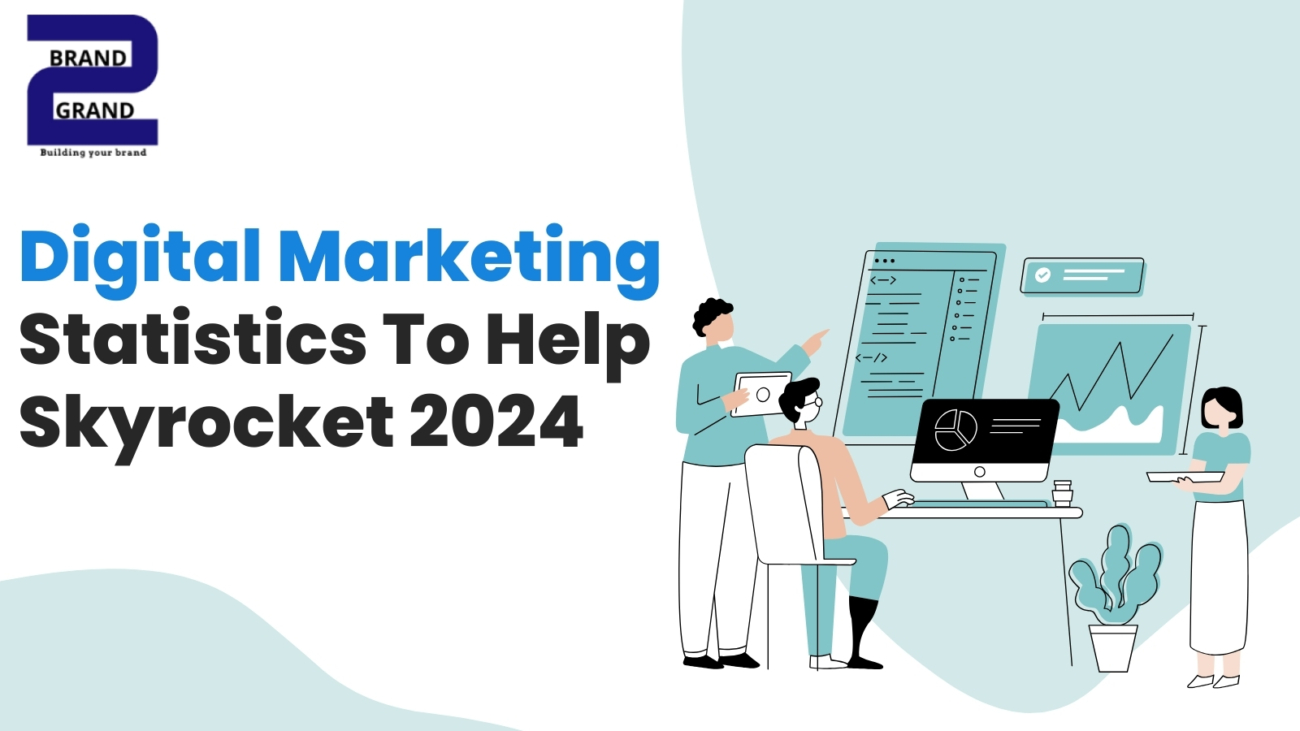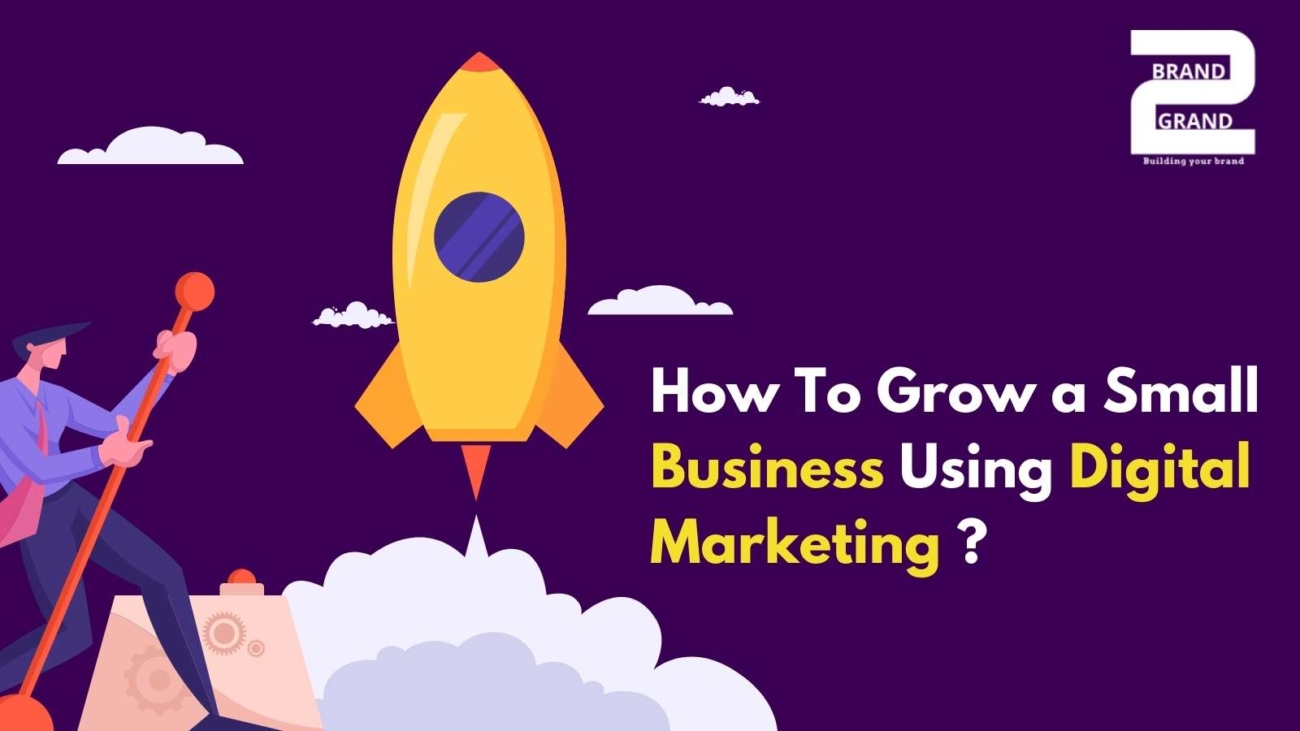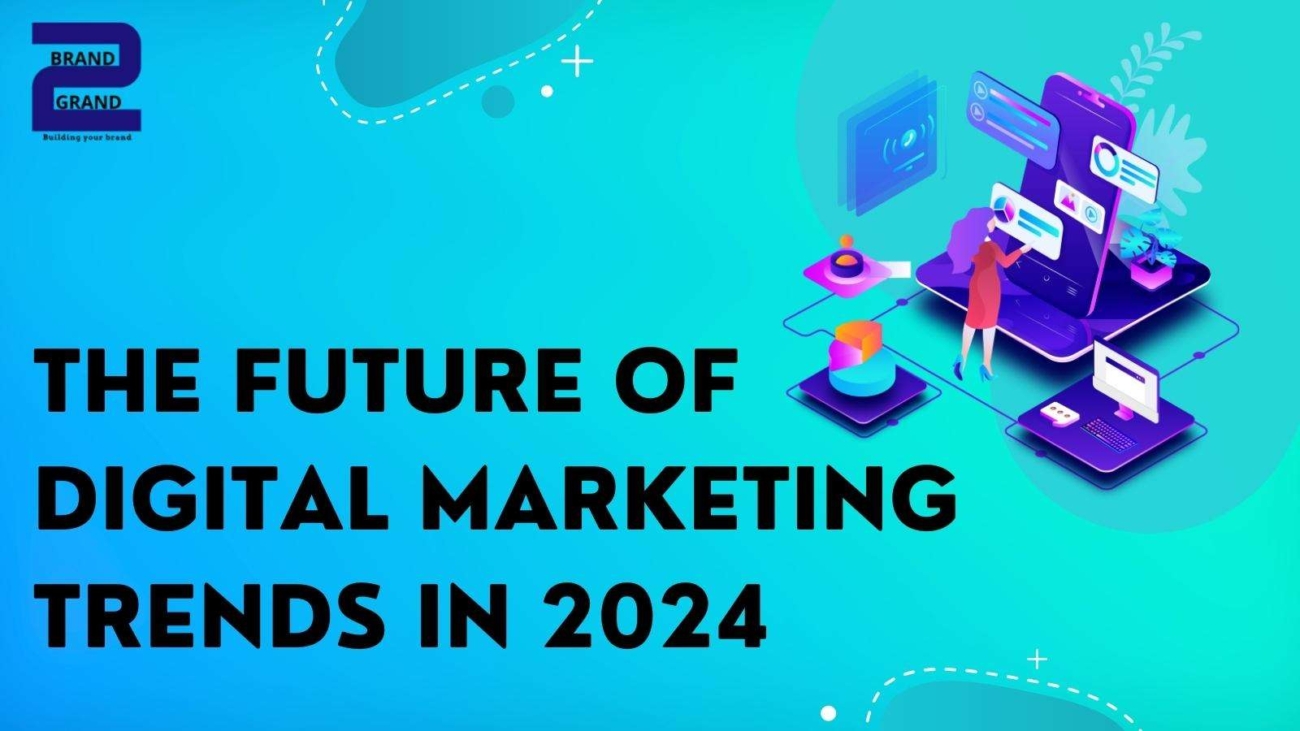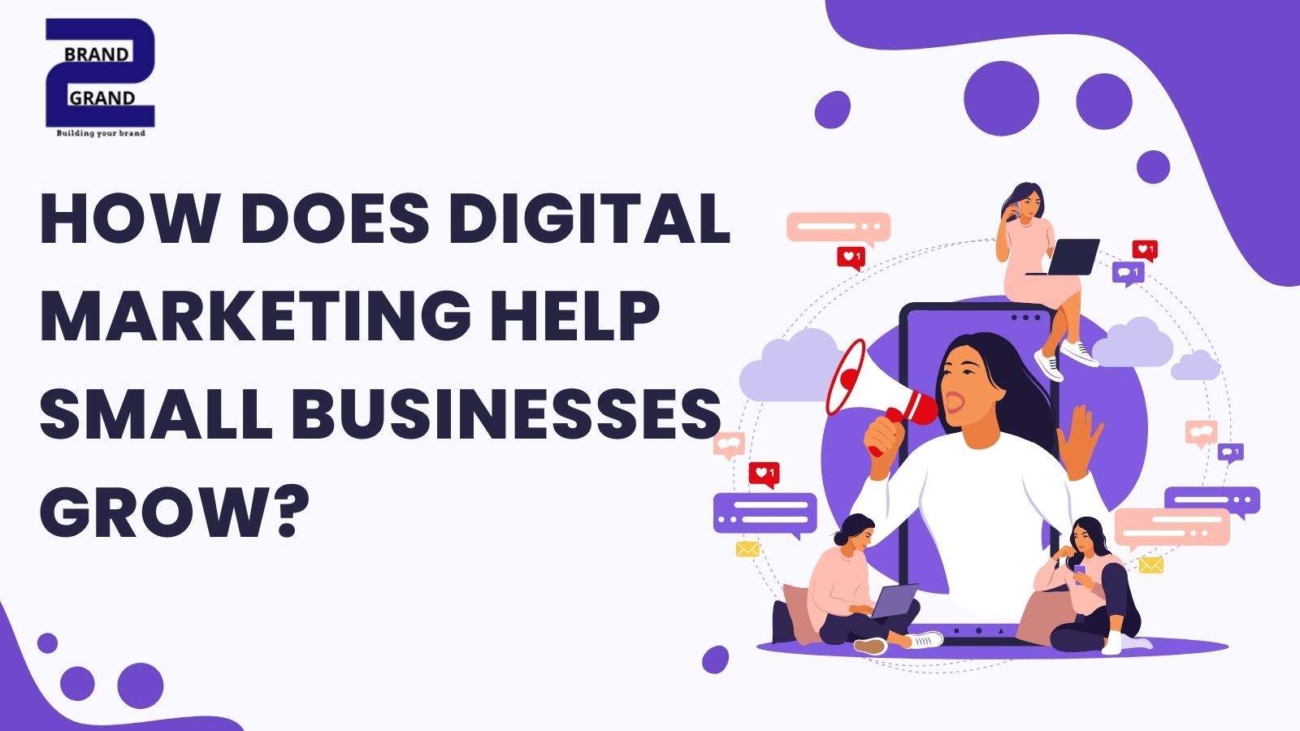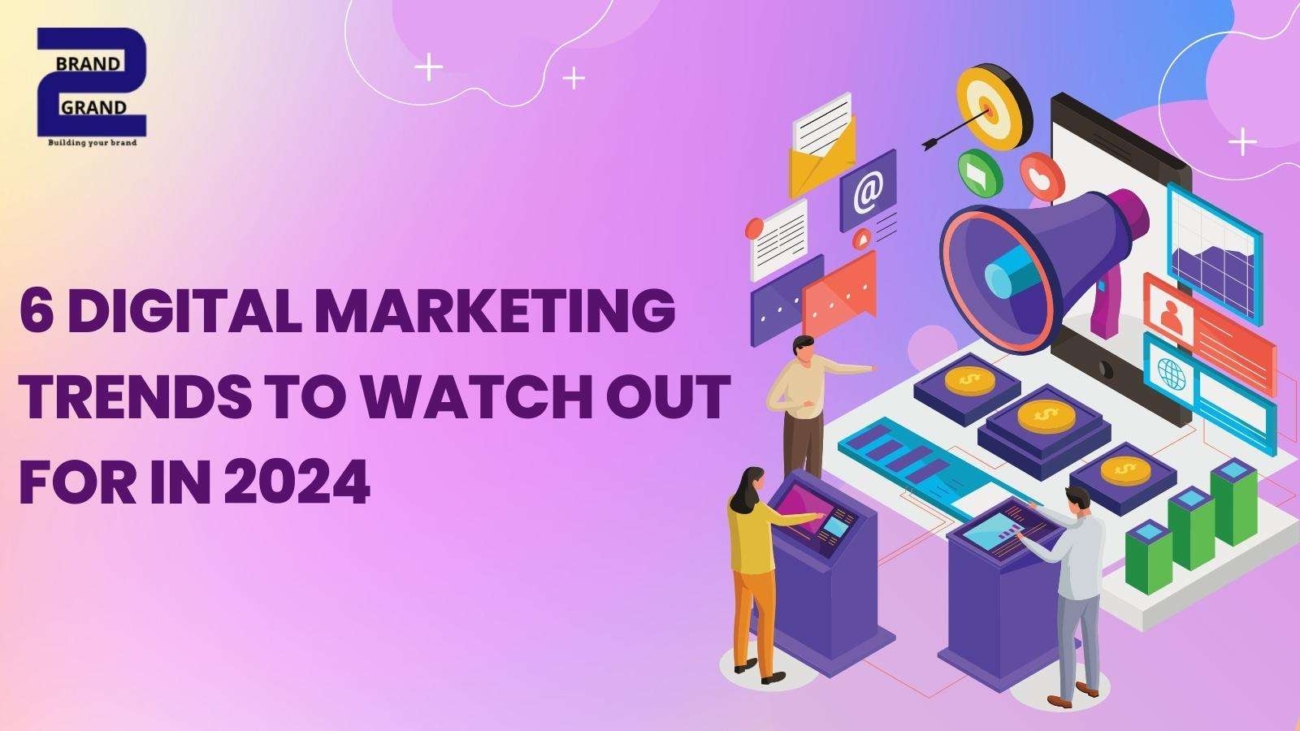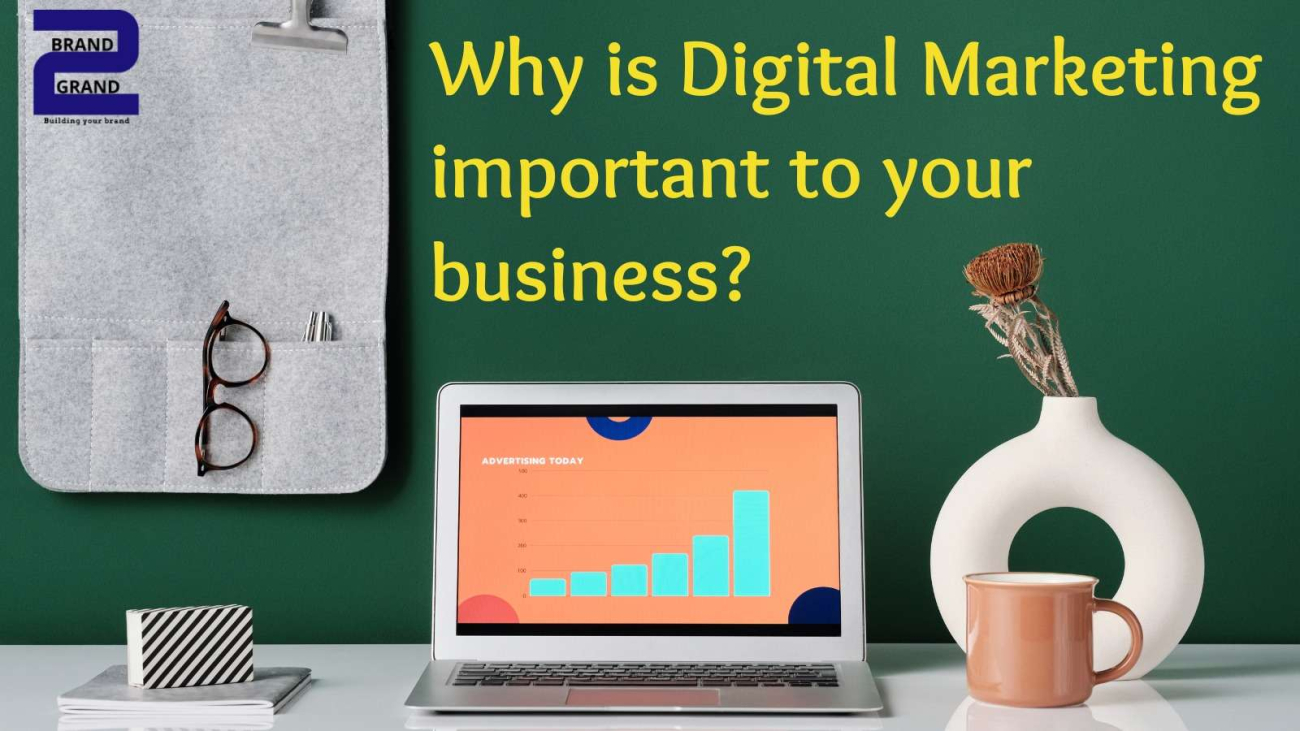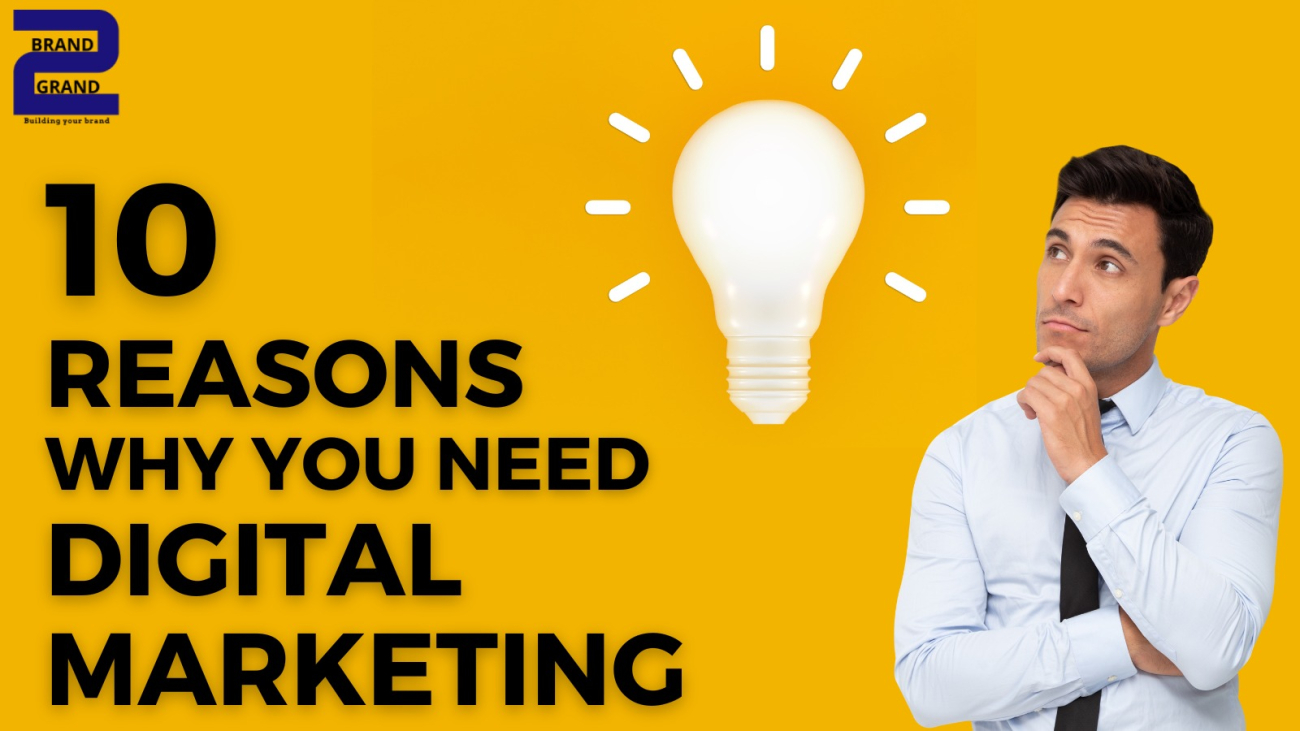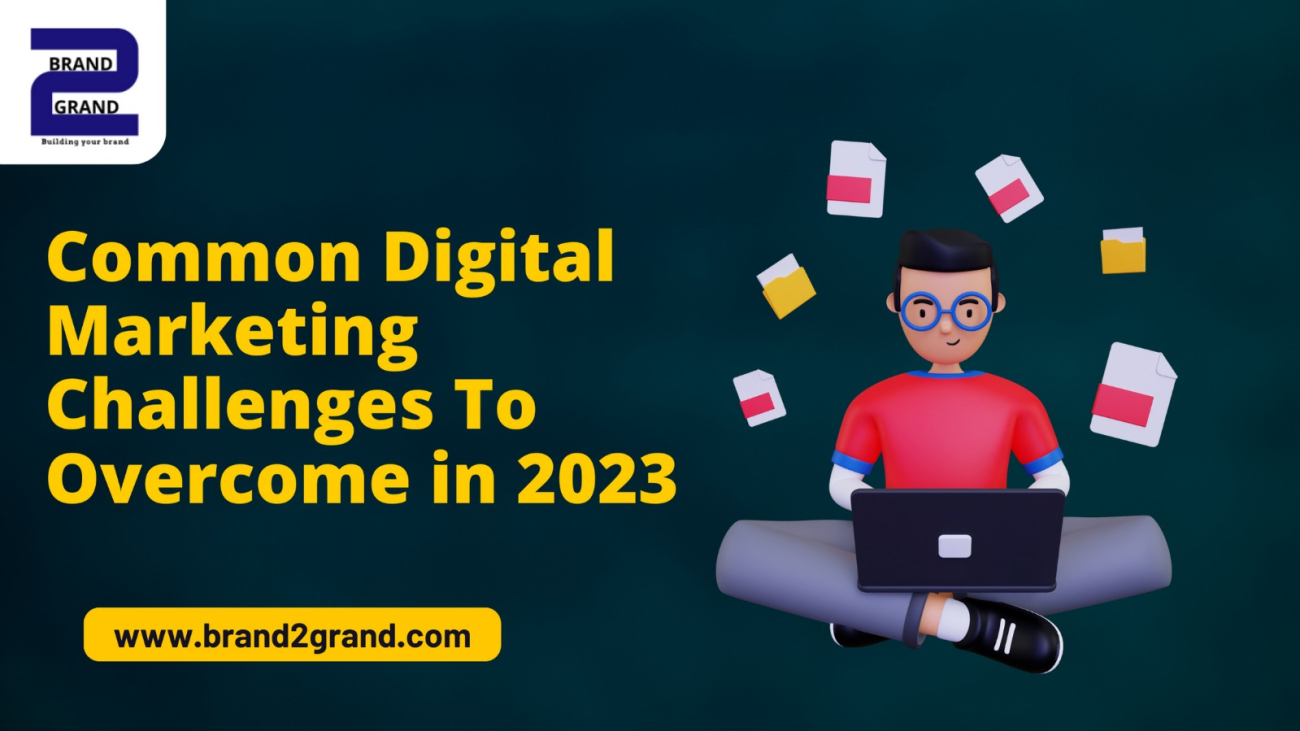While I don’t have real-time data as my training only includes information up until January 2022, I can provide you with some general digital marketing trends and statistics that were relevant at that time. Keep in mind that for the most accurate and up-to-date information, you should refer to the latest industry reports and reputable sources in 2024. Here are some trends and statistics that were pertinent to digital marketing as of 2022:
1. Video Marketing Dominance:-
Video content was on the rise, with platforms like YouTube, TikTok, and Instagram Reels gaining popularity. Businesses were increasingly leveraging video content in their marketing strategies.
2. Rise of Influencer Marketing:-
Influencer marketing continued to be a powerful strategy, with businesses collaborating with influencers to reach their target audiences authentically.
3. Mobile-First Approach:-
The majority of online users were accessing content via mobile devices. As a result, a mobile-first approach in website design and marketing strategies became crucial.
4. Voice Search Optimization:-
With the increasing use of voice-activated devices like smart speakers and virtual assistants, optimizing content for voice search became important for digital marketers.
5. AI and Chatbots:-
Artificial intelligence (AI) and chatbots were being increasingly integrated into digital marketing strategies to enhance customer interactions, personalize content, and streamline communication.
6. Personalization and Customer Experience:-
Personalized marketing experiences were gaining traction, with businesses using data to tailor content and offers to individual preferences.
7. Ephemeral Content:-
The popularity of ephemeral content on platforms like Instagram Stories and Snapchat showcased the importance of creating temporary, engaging content for audience interaction.
8. Interactive Content:-
Interactive content, such as polls, quizzes, and interactive videos, gained popularity for boosting user engagement and providing a more immersive experience.
9. SEO and SERP Features:-
Google’s search engine results pages (SERPs) continued to evolve, with features like featured snippets, knowledge panels, and video carousels impacting SEO strategies.
10. Social Commerce Growth:-
Social media platforms were increasingly becoming e-commerce hubs, with features like shoppable posts and in-app purchasing gaining prominence.
11. Data Privacy Concerns:-
With growing concerns about data privacy, digital marketers were adapting to new regulations and consumer expectations, emphasizing transparency and ethical data practices.
12. Remote Work Impact:-
The shift to remote work influenced digital marketing strategies, with an increased focus on digital channels for communication, collaboration, and customer engagement.
Keep in mind that the digital marketing landscape is dynamic, and trends can change rapidly. Stay updated with the latest industry reports, attend webinars and conferences, and follow reputable marketing blogs to stay informed about the most recent statistics and trends in 2024.
How to grow a small business using digital marketing?
Growing a small business using digital marketing involves leveraging online channels and strategies to reach a broader audience, increase brand awareness, and drive customer engagement. Here’s a comprehensive guide on how to grow a small business using digital marketing:
1. Build a Strong Online Presence:-
– Website Optimization: Ensure your website is user-friendly, mobile-responsive, and optimized for search engines (SEO).
– Google My Business: Claim and optimize your Google My Business listing for local visibility.
2. Define Your Target Audience:-
– Identify your ideal customers and create buyer personas to tailor your marketing efforts accordingly.
3. Content Marketing:-
– Create valuable and relevant content to showcase your expertise and attract your target audience.
– Blogging, videos, infographics, and ebooks can all contribute to a robust content marketing strategy.
4. Social Media Marketing:-
– Choose social media platforms where your audience is active.
– Develop a content calendar and share a mix of promotional and engaging content.
– Utilize paid advertising on platforms like Facebook and Instagram.
5. Email Marketing:-
– Build and segment your email list for targeted communication.
– Implement personalized and automated email campaigns.
– Offer exclusive promotions and incentives to subscribers.
6. Search Engine Optimization (SEO):-
– Optimize your website for relevant keywords to improve search engine rankings.
– Create quality backlinks and regularly update your content.
7. Paid Advertising:-
– Use Google Ads for targeted search engine advertising.
– Consider social media advertising on platforms like Facebook, Instagram, and LinkedIn.
8. Leverage Local SEO:-
– Ensure accurate business information across online directories.
– Encourage customer reviews and respond promptly to feedback.
9. Mobile Optimization:-
– Optimize your website and content for mobile users.
– Consider mobile advertising options for reaching a broader audience.
10. Influencer Marketing:-
– Collaborate with local influencers or micro-influencers in your industry.
– Leverage influencer partnerships for product/service promotions.
11. Analytics and Data Tracking:-
– Use analytics tools to track website traffic, user behavior, and marketing campaign performance.
– Analyze data to make informed decisions and optimize your strategies.
12. Customer Engagement:-
– Actively engage with your audience on social media and respond to comments and messages.
– Encourage user-generated content and customer testimonials.
13. E-commerce Integration (if applicable):-
– If your business involves selling products, consider setting up an online store.
– Optimize the checkout process and offer secure payment options.
14. Partnerships and Collaborations:-
– Explore partnerships with other local businesses for cross-promotions.
– Collaborate with influencers or industry experts for joint initiatives.
15. Customer Retention Programs:-
– Implement loyalty programs and offer exclusive deals to repeat customers.
– Regularly communicate with existing customers through newsletters and updates.
16. Stay Updated and Adapt:-
– Stay informed about industry trends and emerging digital marketing strategies.
– Continuously adapt your approach based on performance metrics and changing market dynamics.
Remember that consistency is key in digital marketing. Regularly monitor your efforts, analyze data, and make adjustments to optimize your strategy over time. Digital marketing is an ongoing process that requires adaptation and refinement based on your business goals and the evolving digital landscape.
The Future of Digital Marketing Trends in 2024
As we look ahead to 2024, the digital marketing landscape is expected to continue evolving rapidly. Here are some key trends and developments that are likely to shape the future of digital marketing:
1. AI and Machine Learning Integration:- Artificial intelligence and machine learning will play an increasingly central role in digital marketing. These technologies will be used to personalize content, automate marketing processes, optimize advertising campaigns, and analyze data for better decision-making.
2. Voice and Visual Search:- Voice and visual search are expected to become more prevalent. Marketers will need to optimize their content for voice and image-based queries, which will change the way SEO and content strategies are approached.
3. Privacy and Data Regulation:- Data privacy concerns and regulatory changes will continue to impact digital marketing. Stricter data protection laws and increased consumer demand for privacy will require marketers to be more transparent in their data collection and usage practices.
4. Content Personalization:- Personalization will become more sophisticated, with brands leveraging data to deliver highly targeted content and product recommendations. Dynamic content and AI-driven personalization will create more engaging and relevant user experiences.
5. Video and Live Streaming:- Video content will maintain its dominance, with live streaming gaining further popularity. Brands will use video to tell stories, provide behind-the-scenes glimpses, and engage with their audience in real time.
6. Ephemeral Content:- The popularity of short-lived, ephemeral content on platforms like Instagram Stories and Snapchat is expected to continue. Marketers will need to harness the FOMO (fear of missing out) effect and create content that encourages immediate engagement.
7. Augmented and Virtual Reality (AR/VR):- AR and VR technologies will see increased adoption in marketing. Brands will use AR for virtual try-ons, product visualization, and interactive advertising campaigns, while VR may be used for immersive brand experiences.
8. Influencer Marketing Evolution:- Influencer marketing will continue to evolve, with a focus on micro-influencers, niche experts, and long-term partnerships. Authenticity and transparency will be crucial for successful influencer collaborations.
9. Sustainability and Social Responsibility:- Consumers will expect brands to be more socially and environmentally responsible. Brands that incorporate sustainability and ethical practices into their marketing efforts will likely gain a competitive edge.
10. 5G Impact:- The rollout of 5G technology will create opportunities for more interactive and data-intensive marketing experiences. Faster internet speeds will enable higher-quality video streaming, augmented reality applications, and more immersive digital experiences.
11. NFTs and Blockchain in Marketing:- Non-fungible tokens (NFTs) and blockchain technology may find applications in digital marketing, including digital collectibles, ownership certificates, and transparent supply chains.
12. Search Engine Changes:- Search engines will continue to evolve. As search engine algorithms become more sophisticated, marketers will need to focus on providing high-quality, relevant content and optimizing for new search behaviors and features.
Digital marketing in 2024 will require adaptability and a focus on creating meaningful and relevant experiences for the target audience while navigating an ever-changing technological and regulatory landscape. Staying updated with industry trends and emerging technologies will be essential for marketers to remain competitive in the digital space.
How does digital marketing help small businesses grow
Digital marketing can be a powerful tool for small businesses looking to grow and succeed in today’s digital age. Here are several ways in which digital marketing can benefit small businesses:
1. Cost-Effective:- Digital marketing is often more cost-effective than traditional marketing methods. Small businesses with limited budgets can reach a broader audience through online channels like social media, email marketing, and search engine optimization (SEO) without the high costs associated with print or TV advertising.
2. Targeted Audience:- Digital marketing allows businesses to target specific demographics and interests, ensuring that their message reaches the most relevant audience. This targeted approach increases the likelihood of conversion and customer engagement.
3. Online Visibility:- Having a strong online presence is crucial in today’s digital landscape. Digital marketing helps businesses establish and maintain their online visibility, making it easier for potential customers to find them through search engines, social media, and other online platforms.
4. Measurable Results:- Unlike traditional marketing, digital marketing provides detailed analytics and performance metrics. Small businesses can track the effectiveness of their campaigns in real-time, allowing them to make data-driven decisions and optimize their strategies.
5. Increased Customer Engagement:- Social media and email marketing enable direct interaction with customers. Small businesses can build relationships, gather feedback, and provide excellent customer service through these channels.
6. Global Reach:- Small businesses can reach a global audience, breaking geographical boundaries and expanding their customer base. This is especially beneficial for businesses looking to grow beyond their local market.
7. Content Marketing:- Creating valuable and relevant content is an essential part of digital marketing. Small businesses can use content to position themselves as industry experts, attract and engage customers, and build trust with their audience.
8. Competitive Advantage:- Digital marketing levels the playing field for small businesses, allowing them to compete with larger corporations. A well-executed digital strategy can help small businesses differentiate themselves in the market.
9. Flexibility:- Digital marketing strategies can be adapted and changed quickly to respond to market trends or adjust to shifting business needs. This agility is essential for small businesses looking to stay competitive.
10. Online Sales:- E-commerce and online marketplaces provide opportunities for small businesses to sell their products and services directly to customers, expanding their revenue streams.
11. Improved ROI:- With the ability to track and analyze campaign performance, small businesses can make data-driven decisions to maximize their return on investment (ROI).
To make the most of digital marketing, small businesses should carefully plan their strategies, understand their target audience, and stay updated with the latest digital marketing trends and technologies. Whether it’s through social media marketing, SEO, email campaigns, or paid advertising, a well-executed digital marketing plan can significantly contribute to a small business’s growth and success.
6 Digital Marketing Trends to Watch Out For in 2024
Digital marketing is a dynamic field, and it’s important to stay ahead of the latest trends to remain competitive and effective. Here are six digital marketing trends to watch out for in 2024:
1. AI-Powered Marketing:-
Artificial Intelligence (AI) and machine learning are set to play an even larger role in digital marketing. AI can analyze vast amounts of data to provide insights, optimize ad campaigns, personalize content, and enhance the customer experience. Chatbots and virtual assistants are also becoming more sophisticated, offering better customer support and engagement.
2. Voice Search Optimization:-
With the increasing popularity of voice-activated devices like smart speakers and virtual assistants, optimizing for voice search is critical. Marketers will need to adapt their SEO strategies to accommodate natural language queries, long-tail keywords, and provide concise, informative answers.
3. Privacy and Data Protection:-
Concerns over data privacy and regulations like GDPR and CCPA are driving changes in digital marketing. Marketers will need to focus on transparent data collection, consent-based marketing, and responsible handling of customer information. Privacy-centric digital advertising strategies will become more prevalent.
4. Video Dominance:-
Video content continues to be a dominant force in digital marketing. Short-form videos, live streams, and interactive video content will be key for engaging audiences. Video SEO and shoppable videos are likely to gain prominence as well.
5. Augmented and Virtual Reality (AR/VR):-
AR and VR technologies are evolving rapidly, offering new opportunities for digital marketing. Brands can create immersive experiences, such as virtual showrooms, try-before-you-buy AR applications, and interactive advertising campaigns to engage and convert customers.
6. Sustainability and Social Responsibility:-
Consumers are increasingly conscious of environmental and social issues. Brands that embrace sustainability and social responsibility in their digital marketing efforts will likely see increased trust and loyalty. This includes highlighting eco-friendly practices, supporting social causes, and adopting ethical advertising practices.
In addition to these trends, it’s important to stay updated on shifts in social media algorithms, emerging platforms, and changes in consumer behavior. Successful digital marketing in 2024 will require agility, adaptability, and a focus on creating meaningful and relevant experiences for the target audience.
9 Tips for Excelling at International Digital Marketing
In today’s interconnected world, international digital marketing has become essential for businesses looking to expand their global reach. However, succeeding in this arena requires a strategic approach that takes into account cultural nuances, language barriers, and diverse consumer behaviors.
Here are nine valuable tips to help you excel at international digital marketing:
1. **Thorough Market Research:**
Before entering a new international market, conduct comprehensive market research. Understand the local culture, preferences, and consumer behaviors. Analyze competitors and identify unique selling points that will resonate with your target audience.
2. **Localization is Key:**
Tailor your marketing content to the specific market you’re targeting. This includes translating your website, social media posts, and advertising materials into the local language. Additionally, adapt your messaging to align with cultural norms and values.
3. **Mobile Optimization:**
In many countries, mobile devices are the primary means of accessing the internet. Ensure your website and digital content are mobile-friendly, with responsive designs and fast-loading pages.
4. **Social Media Mastery:**
Different countries have different social media platforms that dominate the market. Research and choose the most popular platforms for your target audience and create engaging content tailored to each platform.
5. **SEO for Local Search:**
Optimize your website for local search engines. This includes using localized keywords and incorporating location-based content. Register your business on local directories and review platforms to boost visibility.
6. **Understand Local Regulations:**
Familiarize yourself with the legal and regulatory requirements for digital marketing in each target country. Compliance with privacy laws and advertising regulations is crucial to avoid penalties.
7. **Cultural Sensitivity:**
Be culturally sensitive in your marketing campaigns. Avoid content that may be offensive or insensitive to the local population. Consider cultural events and holidays that can be leveraged for marketing purposes.
8. **Data Privacy and Security:**
Respect data privacy laws and ensure the security of customer data. Build trust by being transparent about data usage and protection measures.
9. **Measure and Adapt:**
Implement analytics tools to track the performance of your international campaigns. Monitor key performance indicators (KPIs) and gather customer feedback. Use this data to refine your strategies and adapt to changing market conditions.
In conclusion, excelling at international digital marketing requires a combination of research, adaptation, cultural sensitivity, and ongoing analysis. By investing time and resources into understanding your target markets and tailoring your digital marketing efforts accordingly, you can build a global brand presence and drive success in the international arena.
Why is digital marketing important to your business
In today’s dynamic business landscape, digital marketing has become an indispensable tool for businesses. This blog post aims to explore and highlight the importance of digital marketing in driving business growth and success. We will define digital marketing, underscore its significance in the modern business landscape, and provide an overview of the blog post’s structure.
I. Increased Online Visibility
With the shift towards online consumer behavior, establishing a strong online presence is crucial. We will delve into how digital marketing helps businesses increase their online visibility, enabling them to reach a wider audience and foster brand recognition. Real-life examples of successful online visibility through digital marketing efforts will highlight the potential for growth and success.
II. Targeted Audience Reach
One of the key advantages of digital marketing is its ability to reach specific target audiences. We will explore how businesses can tailor their marketing messages to resonate with the intended audience, resulting in higher engagement and conversions. Case studies will demonstrate the effectiveness of targeted digital marketing campaigns in driving desired actions from the target audience.
III. Cost-Effectiveness
Digital marketing offers a cost-effective alternative to traditional marketing methods. We will compare the costs of digital marketing to traditional marketing, showcasing the potential for maximizing return on investment (ROI) through digital marketing strategies. Real-life examples of cost-effective digital marketing campaigns will illustrate how businesses can achieve remarkable results within budget constraints.
IV. Measurable Results and Analytics
Digital marketing provides businesses with valuable data and analytics. We will explore the importance of tracking and measuring the success of marketing campaigns, enabling businesses to make data-driven decisions and optimize their marketing efforts. Furthermore, we will emphasize how data-driven insights inform future marketing strategies, leading to continual improvement and growth.
V. Enhanced Customer Engagement
Digital marketing allows businesses to create personalized experiences that engage customers on a deeper level. We will explore the use of interactive content, tailored messaging, and personalized campaigns that resonate with the target audience. Case studies will demonstrate how effective customer engagement through digital marketing efforts leads to improved customer retention and loyalty.
VI. Improved Customer Targeting
Digital marketing empowers businesses to collect valuable customer data for targeted marketing efforts. We will discuss the importance of understanding customer preferences, behaviors, and buying patterns through digital marketing strategies. By applying these insights, businesses can refine their marketing strategies and optimize customer targeting for better results.
VII. Adaptability to Changing Trends
The digital landscape is dynamic, constantly evolving with emerging trends and technologies. We will explore how digital marketing enables businesses to adapt and stay ahead of the competition. We will discuss the importance of agility and proactive strategies in embracing new trends and technologies, showcasing the potential for continuous growth and success.
VIII. Brand Building and Reputation Management
Digital marketing plays a crucial role in establishing a strong online brand presence. We will discuss how businesses can effectively manage and enhance their brand reputation in the digital space. We will explore the utilization of social media and content marketing to build brand authority and foster trust among the target audience.
IX. Enhanced Business Growth and Success
Digital marketing has a significant impact on business growth and success. We will emphasize how digital marketing strategies contribute to expanding customer reach, increasing conversions, and ultimately driving business growth. Case studies will showcase how businesses have achieved remarkable results through effective digital marketing campaigns.
X. Conclusion
In conclusion, digital marketing is vital to the success of businesses in the digital age. By harnessing the power of digital marketing, businesses can increase their online visibility, reach their target audience more effectively, achieve cost-effective results, and build long-term customer relationships. We encourage businesses to prioritize digital marketing strategies and leverage its immense potential for growth and success. As the digital landscape continues to evolve, businesses must adapt and embrace digital marketing to remain competitive and thrive in the future.
Why Is Digital Marketing So Important to Businesses
In today’s rapidly evolving business landscape, digital marketing has emerged as a critical component for businesses of all sizes. This blog post aims to explore and emphasize the importance of digital marketing in driving business growth and success. We will define digital marketing, highlight its significance in the current business landscape, and provide an overview of the blog post’s structure.
I. Increased Online Presence
The online marketplace has become increasingly influential, and establishing a robust online presence is vital for businesses. We will delve into how digital marketing enables businesses to establish and expand their online presence, reaching a wider audience and fostering brand recognition. Real-life examples of successful online brand building through digital marketing will underscore the potential for growth and success.
II. Targeted Audience Reach
One of the key advantages of digital marketing is its ability to reach specific target audiences. We will explore how businesses can tailor their marketing messages to resonate with the intended audience, resulting in higher engagement and conversions. Case studies will showcase the effectiveness of targeted digital marketing campaigns in driving desired actions from the target audience.
III. Cost-Effectiveness
Comparing digital marketing to traditional marketing methods, we will outline the cost advantages that digital marketing offers. Digital marketing provides businesses with cost-effective strategies that deliver a higher return on investment (ROI). Real-life examples of successful and cost-effective digital marketing campaigns will illustrate how businesses can achieve impressive results within budget constraints.
IV. Measurable Results and Analytics
Digital marketing provides businesses with access to valuable data and analytics. We will explore the importance of tracking and measuring the success of marketing campaigns, enabling businesses to make data-driven decisions and optimize their marketing efforts. Furthermore, we will highlight how data-driven insights inform future marketing strategies, leading to continual improvement and growth.
V. Enhanced Customer Engagement
Digital marketing allows businesses to create personalized experiences that engage customers on a deeper level. We will explore the use of interactive content, tailored messaging, and personalized campaigns that resonate with the target audience. Case studies will demonstrate how effective customer engagement through digital marketing leads to improved customer retention and loyalty.
VI. Improved Customer Targeting
Digital marketing provides businesses with the tools to collect valuable customer data, enabling targeted marketing efforts. We will discuss the importance of understanding customer preferences, behaviors, and buying patterns through digital marketing efforts. By applying these insights, businesses can refine their marketing strategies and optimize customer targeting for better results.
VII. Adaptability to Changing Trends
The digital landscape is dynamic and ever-evolving. We will explore how digital marketing enables businesses to adapt to emerging trends and technologies. We will discuss the importance of staying ahead of the competition through agile digital marketing strategies, including the use of A/B testing and continuous monitoring of industry shifts.
VIII. Integration with Traditional Marketing
Digital marketing seamlessly complements and enhances traditional marketing efforts. We will explore the synergy between online and offline marketing channels, showcasing how businesses can create cohesive and impactful integrated marketing campaigns. Examples of successful integrated marketing campaigns will highlight the benefits of leveraging both digital and traditional marketing channels.
IX. Brand Building and Reputation Management
Digital marketing plays a crucial role in establishing a strong online brand presence. We will discuss how businesses can effectively manage and enhance their brand reputation in the digital space. We will explore the utilization of social media and content marketing to build brand authority and foster trust among the target audience.
X. Conclusion
In conclusion, digital marketing is of utmost importance to businesses in today’s digital age. By harnessing the power of digital marketing, businesses can increase their online presence, reach their target audience more effectively, achieve cost-effective results, and build long-term customer relationships. We encourage businesses to prioritize digital marketing strategies and leverage its immense potential for growth and success. As the digital landscape continues to evolve, businesses must adapt and embrace digital marketing to remain competitive and thrive in the future.
10 Clear Reasons Why You Need Digital Marketing?
In today’s modern business landscape, digital marketing has become an essential tool for businesses of all sizes. This blog post aims to explore and highlight ten clear reasons why digital marketing is crucial for business success. We will define digital marketing, discuss its significance in the current business landscape, and provide an overview of the blog post’s structure.
I. Reach a Global Audience
Digital marketing provides businesses with an unprecedented opportunity to reach a global audience. We will explore the vast reach and accessibility of digital marketing channels, breaking down geographical barriers and allowing businesses to expand their customer base beyond traditional boundaries. Case studies of successful global digital marketing campaigns will further emphasize the immense potential of reaching a global audience through digital marketing strategies.
II. Targeted Marketing
One of the key advantages of digital marketing is its ability to target specific demographics, interests, and behaviors. We will delve into how businesses can tailor their marketing messages to resonate with their intended audience, leading to higher engagement and conversions. Real-life examples of effective targeted digital marketing campaigns will showcase the power of segmentation and personalization.
III. Cost-Effectiveness
Comparing digital marketing to traditional marketing methods, we will outline the cost advantages that digital marketing offers. Businesses can optimize their return on investment (ROI) by utilizing cost-effective digital marketing strategies. We will present real-life examples of successful digital marketing campaigns that have provided significant results within budget constraints.
IV. Measurable Results and Analytics
Digital marketing provides businesses with access to valuable data and analytics. We will explore the importance of tracking and measuring the success of marketing campaigns, enabling businesses to make data-driven decisions and optimize their marketing efforts. Case studies and examples will illustrate how data-driven insights inform future marketing strategies and contribute to business growth.
V. Personalization and Customer Engagement
Digital marketing allows businesses to create personalized experiences for customers, fostering engagement and building strong relationships. We will explore the use of interactive content, tailored messaging, and personalized campaigns that resonate with the target audience. Case studies will demonstrate how personalization leads to improved customer retention and loyalty.
VI. Flexibility and Adaptability
Digital marketing offers flexibility and adaptability, allowing businesses to quickly adjust and optimize their campaigns based on real-time insights. We will discuss the importance of A/B testing, experimenting with different approaches, and staying ahead of trends and changes in the digital landscape. Business examples will showcase the benefits of being agile in digital marketing strategies.
VII. Integration with Traditional Marketing
Digital marketing seamlessly complements and enhances traditional marketing efforts. We will explore the synergy between online and offline marketing channels, demonstrating how businesses can create cohesive and impactful integrated marketing campaigns. Case studies will highlight successful examples of leveraging both digital and traditional marketing channels.
VIII. Brand Building and Reputation Management
Digital marketing plays a vital role in establishing a strong online presence, managing brand reputation, and building brand authority. We will discuss strategies for leveraging social media and content marketing to engage with audiences and enhance brand reputation. Real-life examples will showcase how businesses have successfully utilized digital marketing for effective brand building.
IX. Improved Customer Insights and Targeting
Digital marketing enables businesses to collect valuable customer data, leading to informed decision-making. We will explore the importance of understanding customer preferences, behaviors, and buying patterns through digital marketing efforts. Businesses can then apply these insights to refine marketing strategies, enhance customer experience, and drive business growth.
X. Conclusion
In conclusion, digital marketing is essential for businesses in the digital age. Through its ability to reach a global audience, target specific demographics, provide cost-effective solutions, measure results, personalize experiences, and adapt to changing trends, digital marketing empowers businesses to succeed in today’s competitive landscape. By integrating digital marketing with traditional methods, businesses can enhance brand building, reputation management, and customer insights. We encourage businesses to prioritize digital marketing and leverage its immense potential to drive growth and achieve long-term success.
As we look to the future, digital marketing will continue to evolve, offering new opportunities for businesses to connect with their target audience, build brand loyalty, and drive business results in an increasingly digital world.
Common Digital Marketing Challenges To Overcome in 2023
Digital marketing is constantly evolving, and as we approach 2023, new challenges are likely to arise. In order to stay ahead of the curve, businesses need to be aware of these challenges and develop strategies to overcome them.
Here are some common digital marketing challenges to overcome in 2023:
Adapting to Changing Algorithms: Social media algorithms are constantly changing, making it difficult for businesses to keep up. In order to stay relevant, businesses need to be aware of these changes and adjust their strategies accordingly. This may involve creating more engaging content or investing in paid advertising.
Increasing Competition: As more businesses shift their focus to digital marketing, competition is likely to increase. In order to stand out, businesses need to be creative and innovative in their approach. This may involve investing in new technologies or finding new ways to engage with customers.
Managing Data Privacy: With increasing concerns around data privacy, businesses need to be careful with how they handle customer data. This may involve implementing stricter security measures or being more transparent about data collection and usage.
Keeping Up with Technology: Technology is constantly evolving, and businesses need to stay up-to-date in order to remain competitive. This may involve investing in new tools or software to streamline processes and improve efficiency.
Measuring ROI: Measuring the return on investment (ROI) of digital marketing efforts can be challenging. Businesses need to be able to accurately track and analyze data in order to determine the effectiveness of their strategies.
In conclusion, digital marketing presents many challenges for businesses, but by staying aware of these challenges and developing strategies to overcome them, companies can stay ahead of the curve. Adapting to changing algorithms, increasing competition, managing data privacy, keeping up with technology, and measuring ROI are just a few of the challenges that businesses will face in 2023. By investing in new technologies, being innovative in their approach, and prioritizing data privacy and security, businesses can overcome these challenges and succeed in the ever-evolving world of digital marketing.


